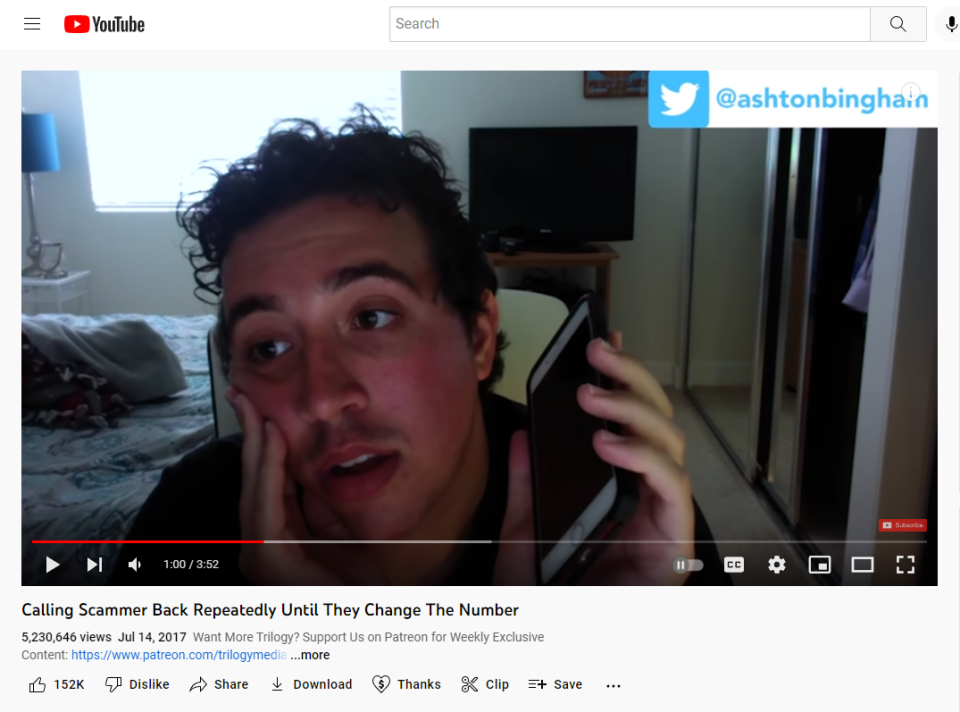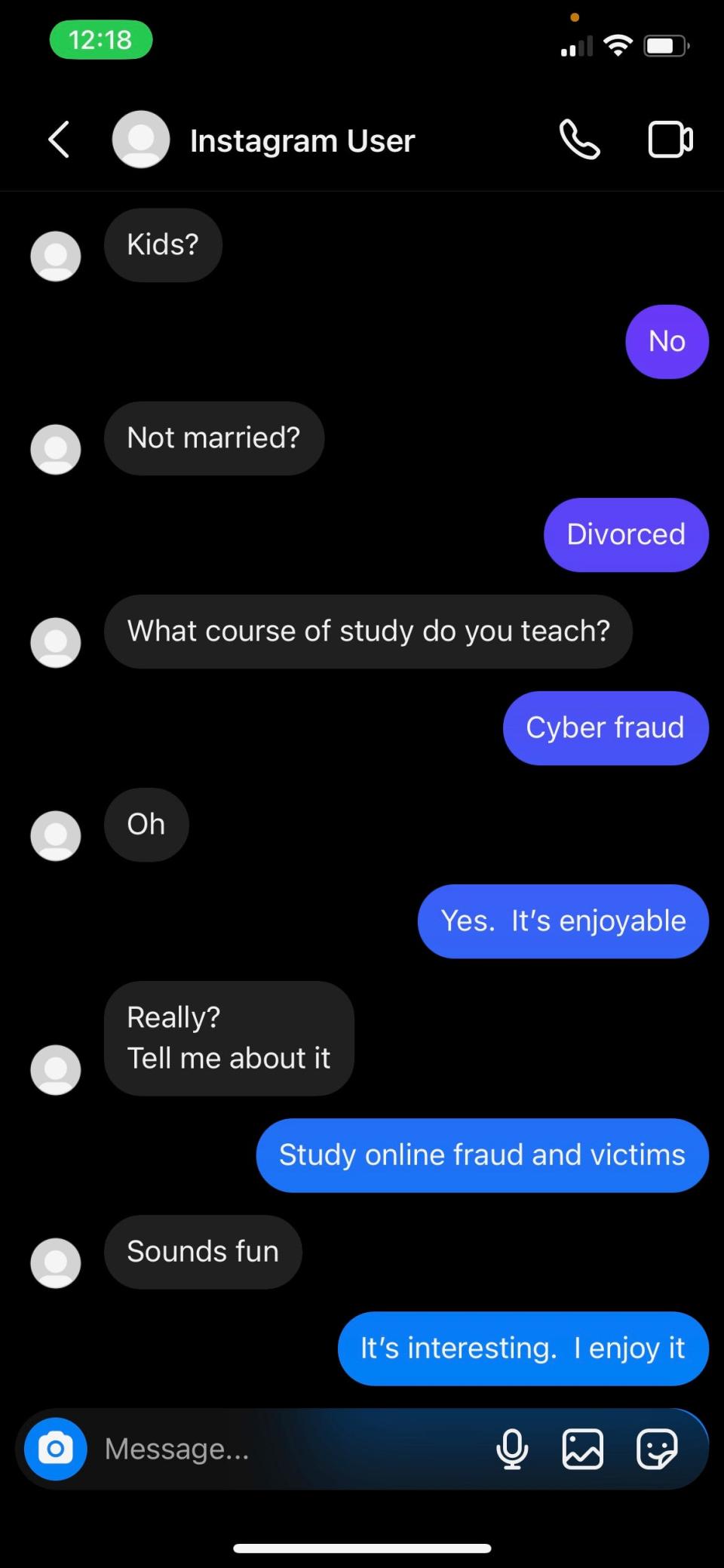Millions of Americans lose money to scams every year. One group of YouTubers is trying to help.
In the summer of 2017, Ashton Bingham received troubling news from the IRS: An arrest warrant was issued under his name, and his address was under federal investigation.
“Listen to me carefully,” an agent told Bingham over the phone. “Make sure that you do not interrupt me in the middle while I’m going to be providing these informations to you. And it’s also my job to make –”
That’s when Bingham gave a comically loud sneeze. The caller paused.
“I’m sorry, it was a sneeze. Keep going,” Bingham said, casually resting his face in his hand.
The person on the other end of the phone call blew up.
“Why the (expletive) don’t you hang up the phone call?” the voice said, confirming what Bingham already knew: It was a scam call. A yelling match ensued, each insult recorded by Bingham, before the "IRS agent" hung up.
The video shows Bingham dialing the scammer six more times, stopping only when the calls failed. He went on to post the video on YouTube.

With more than 5 million views today, the recording was the first viral video that catapulted Bingham and his business partner, Art Kulik, into becoming full-time scambaiters – content creators on platforms like YouTube, Twitch and TikTok who pretend to fall for scams to hurt the scammers' operations.
The duo now leads a five-person team that focuses on producing scambaiting content under the name Trilogy Media.
The idea behind scambaiting is that wasting scammers' time will prevent them from contacting others who might fall for their tricks. While some experts question the efficiency of scambaiting tactics, content creators say they're helping pare down the number of people falling victim to scams.
“Keeping them on the phone for a long time makes their job difficult. And the more we expose their tactics, the less effective they become,” Bingham told USA TODAY. “It's not like they're ever going to go away. But the more that we can keep swatting them with a flyswatter, it can make a dent in it."

How do scambaiters work?
Some scambaiters come off as pranksters, putting on voices and playing characters to waste scammers’ time and entertain viewers. Others go to more extreme lengths, sharing information with law enforcement or hacking into call centers to gain access to security camera footage (the latter of which is illegal).
Either way, the content creators say their videos are meant to protect more people from scams. Spam detection app TrueCaller found as many as 68.4 million Americans reported losing money from phone scams over the past 12 months, according to a March survey among more than 2,000 adults conducted by The Harris Poll. That's up from nearly 60 million the year prior.
“We just want to take down the bad guys,” said Rosie Okumura, a YouTuber and voice actress who started posting scambaiting videos after her mom nearly lost $500 to a scam caller. Her account, IRLrosie, shows her using her voice talents to make scammers think they have Britney Spears or the virtual assistant Siri on the line.
Senate report: Fraud, scam cases increasing on Zelle
Research shows consumers today are more wary of scam risks than years past, although it’s unclear how much of that awareness comes from scambaiting videos.
A 2021 report from Microsoft found consumers have grown more skeptical of unsolicited contact about tech support calls or pop-up messages. Nearly 80% think it’s unlikely a reputable company would contact them in this way, up 5 percentage points from 2018.
That shift follows a spike in the scambaiting community. The r/scambait subreddit grew from 35,500 subscribers in September 2019 to 138,000 today. Okumura’s YouTube subscribers have more than doubled from 450,000 in June 2020, while Trilogy Media's YouTube subscriber count has more than tripled over the past two years to 781,000.

“Ten, 15 years ago, these were mostly communities on little-known internet forums,” said Joshua Smallridge, associate professor of criminal justice at Fairmont State University in West Virginia. “With Web 2.0 and switching over to video platforms and just how that brought more of a spotlight on this, I think we have seen the community grow.”
What type of people are scammers?
Adam Scott Wandt, assistant professor and vice chair for technology at John Jay College of Criminal Justice, had been researching online fraud for years when an Instagram user claiming to be a model based in Asia messaged him in the spring of 2021.
Out of curiosity, Wandt replied.

“I wanted to talk to him just to kind of get an idea of who he was and why he was doing this,” he said.
Wandt said once the scammer realized he wasn't falling for the act, the scammer revealed he was a man based in Central America. Wandt said the man told him scamming was his only source of income during the pandemic, when unemployment rates around the world spiked.
It’s a common theme for scammers, many of whom are located in areas with few economic opportunities. India, known for its fraudulent call centers, had a 6.4% unemployment rate last month, per the independent think tank and business information company Centre for Monitoring Indian Economy.
“These aren't career criminals, necessarily, that are trying to scam us,” Wandt said. “A lot of these are people who are unemployed, and to make money they go and sign up for what in their country is a legitimate business: Stealing money from us.”
Bingham of Trilogy Media acknowledged that a lot of the scammers they encounter are “young kids that are there for reasons out of their control,” but believes that doesn’t mean scambaiters should quit.
“I think that would be the wrong solution,” he said. “The more time we waste of scammers, the less time they can spend scamming people.”
Okumura said she’s gotten to know some of the scammers on the other end of her calls and remains friends with one.
The scammer – who Okumura said is declining all interviews – reportedly told the YouTuber that he learned how to scam from his cousin and was trying to save money to go to school. He didn’t feel bad about the scam, Okumura said, because he believed “everyone in America is rich and greedy and stupid.”
Hurricane Ian: Here come the scams. (And how to avoid them)
Okumura said she tries not to take the scambaiting “too seriously” because she knows the scammers at the other end are human, too.
“It’s rare that people are just innately bad and evil. It has to come from some sort of desperation,” she said. “That being said, there's still other ways to try to make it work than steal from other people.”
Is scambaiting ethical?
While experts acknowledge that scambaiting videos have the potential to raise awareness, they say more research needs to be done to determine the effect these videos have on taking down scammers.
“If pursuing a drug dealer on the street corner does not tackle organized drug crimes, then why would a scambaiter wasting (the time of) an individual?" said Dara Byrne, dean of the City University of New York’s Macaulay Honors College and a professor of communication at John Jay College who has researched online vigilanteism. "That Whack-a-Mole kind of technique has never worked.”
Scam trends: Text scams surge as robocalls decline, report finds
Byrne also noted that her research has looked at racist practices among some scambaiting subgroups, including chat rooms where scambaiters would try to humiliate scammers and collect “trophies” by having scammers send photos of them performing embarrassing acts.
These sort of artifacts, she found, were similar to lynching memorabilia.
But that focus on humiliation has eased in recent years in the scambaiting world, with content creators today more focused on education and entertainment, according to Andrew Ross, a senior lecturer at the University of Canberra who has researched scambaiting discourse.
“It's sort of spiraled out into this awareness-raising potential, which it didn't seem to used to have. It seems to have lost this sinister, dark edge,” Ross said. “It has this real educative potential.”
But Wandt believes the YouTubers' time would be better spent reaching out to the Federal Trade Commission, U.S. Attorney General’s office or a congressperson to put pressure on the government to stop scammers.
Caller ID scam: Now scammers are impersonating utility companies with caller ID
Okumura notes that most scambaiters know that eliminating all scams is an impossible task. She said that for her, it’s all about trying to spread awareness one viewer at a time.
“I get emails every day and DMs every day (saying), ‘Thank you so much for that video, I would have fallen for that Bitcoin scam,’ or ‘My Instagram did get hacked last week, I wish I would have seen (your video),” she said. "I try my best to just take a preventative approach that’s educational and comedic."
You can follow USA TODAY reporter Bailey Schulz on Twitter @bailey_schulz and subscribe to our free Daily Money newsletter here for personal finance tips and business news every Monday through Friday.
This article originally appeared on USA TODAY: Scambaiting: Why people love to watch videos of scammers being scammed

 Yahoo Finance
Yahoo Finance 